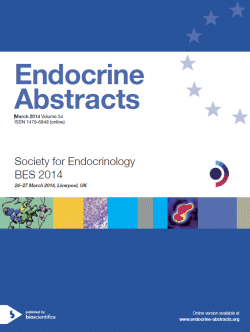Poster Presentations
Nursing practise
ea0034p192 | Nursing practise | SFEBES2014
Steroid group education: developing a curriculum ensures good nursing practice is maintained
ea0034p193 | Nursing practise | SFEBES2014
Time taken for GH-treated adolescent patients, transitioning to adult services, to reach IGF1 levels within the upper normal range: do we need to monitor more frequently?
Grounds Kerrie , Didi Mohammed , Corlett Pamela , Whittingham Pauline , Ahmad Aftab
ea0034p194 | Nursing practise | SFEBES2014
Life, death and modern technology: an update
ea0034p195 | Nursing practise | SFEBES2014
Intervention of ward visits by an endocrine nurse specialist and a protocol and in the management of hyponatraemia
Mason Rhianne , Forbes Charlotte , Williams Seren , McDonald Timothy , Brooke Antonia
ea0034p196 | Nursing practise | SFEBES2014
Treating vitamin D deficiency in coeliac patients
Komlosy Nicci , Jagger Caroline
ea0034p197 | Nursing practise | SFEBES2014
Integrating a new drug into clinical practice and enhancing the patient experience
ea0034p198 | Nursing practise | SFEBES2014
Emergency hydrocortisone kits: assessment of knowledge and skills of patients and family
Shepherd Lisa , Ulnasah Sadaf , Rahim Asad , Shakher Jayadave , Bates Andrew




